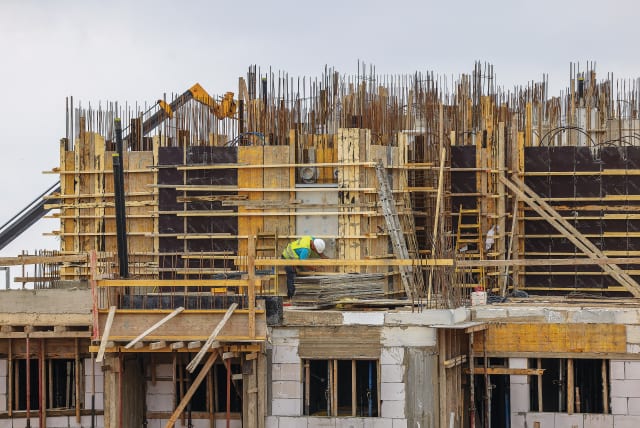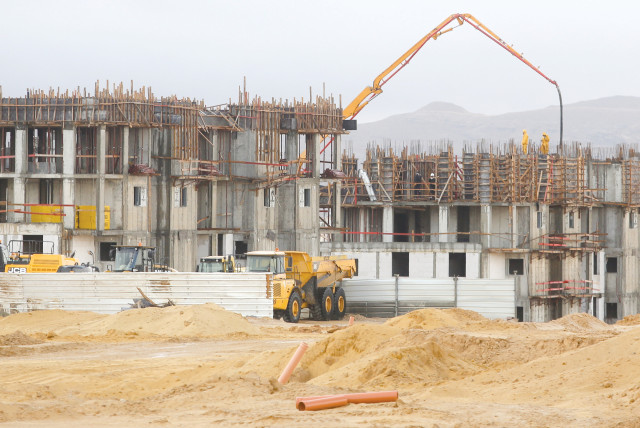Israeli judicial reform strife will harm the housing market - opinion

This would result in constitutional chaos, a surge in rental market prices, and a significant halt in real estate transactions until the legal situation is clarified.
The residential housing construction market is facing a severe crisis, evidenced by a 43% decrease in building starts. Additionally, the number of unsold flats held by contractors has risen to over 57,000, equivalent to two years of sales. Furthermore, there has been a 46% decline in the volume of real estate transactions.
This crisis has intensified amid an ongoing confrontation between Prime Minister Benjamin Netanyahu and his supporters, who seek a government upheaval, and the protest leaders and demonstrators, who have been rallying against the “coup” for 30 weeks without showing any signs of relenting.
As of mid-July, this fierce clash reached a critical stage, reminiscent of the adage that “the real war takes place in the minds of generals and leaders.” This saying, attributed to Publius Cornelius Scipio, a renowned Roman general regarded by Liddell-Hart as “greater than Napoleon” for his victory over Hannibal at the Battle of Zama in 202 BCE, is gaining renewed relevance.
The leaders of the protest face a classic dilemma of determining when and with what strength to deploy their mobile reserves into battle. In this case, the reserves consist of Air Force pilots, Intelligence Corps personnel, and possibly members of the Israel Medical Association. Their objective is to impede the legislative blitz scheduled for the second half of July.
However, they must consider that mobilizing these reserves is subject to legal restrictions, which prohibit organized activity and require individuals to resign individually, without assurance that their colleagues will follow suit. On the other hand, if the resignations are not widespread, individuals may find themselves with no path of return.
It’s important to note that in March, the threat of mobilizing reserves slowed down the legislative onslaught but did not defeat it. Presently, the protest leaders are preparing to renew their offensive, which began with the initial approval of the law to eliminate the standard of reasonableness.
VARIOUS POLITICAL and economic scenarios could arise from this complex situation, contingent on factors such as when President Joe Biden adopts a tougher stance towards Netanyahu, how the dollar exchange rate reacts to ongoing legislative processes, and whether police volunteers (mostly older individuals) comprising nearly 50% of the police force join the pilots and intelligence officers in their protest.
The judicial reform, if passed, will harm Israel's housing market
I believe the emerging scenario will significantly impact the entire economy, particularly the housing market, which is already experiencing a downturn. If the legislation is passed, I anticipate a sharp decline in the shekel’s value against the dollar, from its current range of 3.6–3.7 shekels to the dollar. A devaluation to approximately four shekels to the dollar would result in an inflation increase of 1.5% to 2.0%. Consequently, the Bank of Israel would be compelled to raise the interest rate.
These domestic developments may be compounded by external actions, such as a reduction in Israel’s credit rating, further intensifying pressure on the shekel. These effects are likely to manifest in the economy in the coming months if the proposed legislation is enacted.
Another interest rate hike would worsen the housing market’s slowdown, making mortgages more expensive and prompting further increases in rent prices.
Another factor gaining momentum is the predicament faced by individuals seeking to upgrade their housing. Many wrongly estimated that the annual increase in housing prices of 10% or more would continue. Consequently, they delayed selling their current properties in hopes of profiting from the anticipated price surge.
However, the two-year window to qualify for exemptions from purchase tax and betterment tax is closing, and there is currently a lack of buyers, particularly at the current price level. This growing group of sellers will exacerbate the housing market slowdown.
Within this political and economic scenario, there remains the possibility that Netanyahu, similar to his actions in March, will suspend the legislative process for the remainder of the current Knesset session, which concludes at the end of July. He may then resume activity during the winter session commencing in October 2023. This strategic move would serve as an example of the battle of minds, casting the resigned reservists in a problematic light.
Halting the legislative initiative, even if only temporarily, would partially alleviate the housing market slowdown. However, in my estimation (and I hope to be proven wrong), Netanyahu, who has grown accustomed to the demonstrations, will persist and approve the repeal of the standard of reasonableness. This would result in constitutional chaos, a surge in rental market prices, and a significant halt in real estate transactions until the legal situation is clarified.
The writer is the head of the MBA program in real estate financing at The Hebrew University School of Business, Jerusalem.
Jerusalem Post Store
`; document.getElementById("linkPremium").innerHTML = cont; var divWithLink = document.getElementById("premium-link"); if (divWithLink !== null && divWithLink !== 'undefined') { divWithLink.style.border = "solid 1px #cb0f3e"; divWithLink.style.textAlign = "center"; divWithLink.style.marginBottom = "15px"; divWithLink.style.marginTop = "15px"; divWithLink.style.width = "100%"; divWithLink.style.backgroundColor = "#122952"; divWithLink.style.color = "#ffffff"; divWithLink.style.lineHeight = "1.5"; } } (function (v, i) { });


